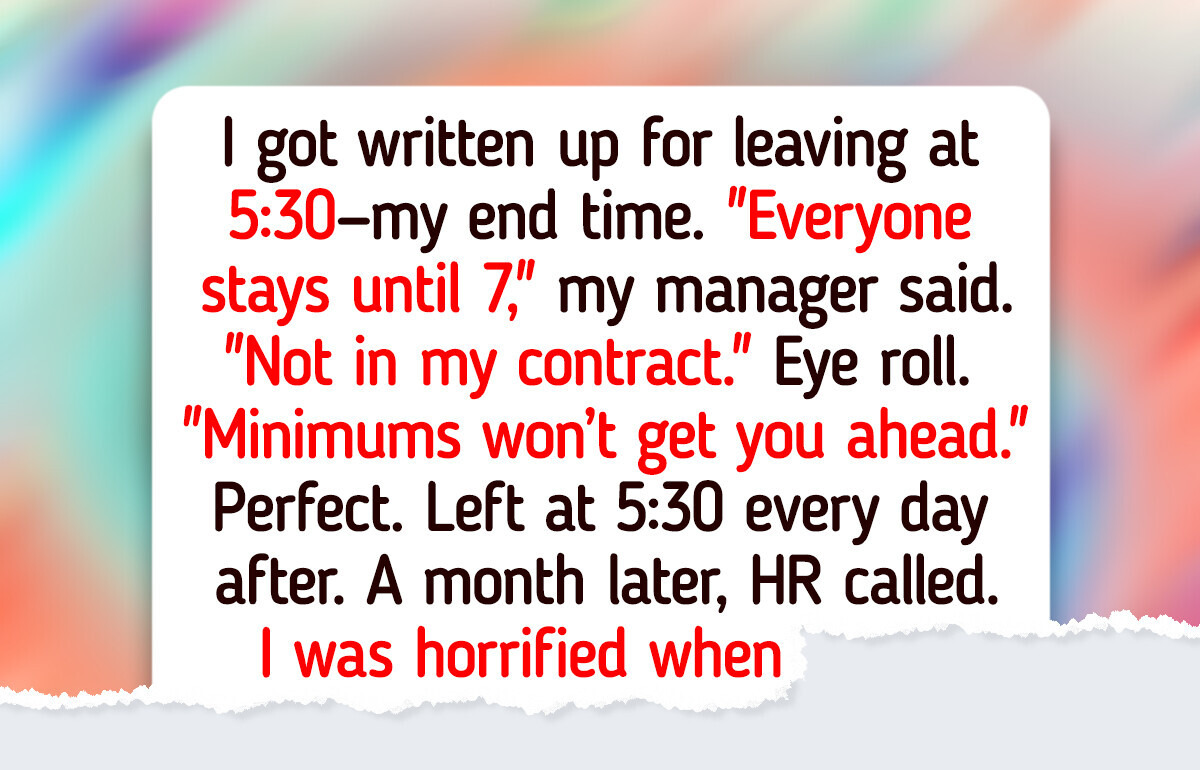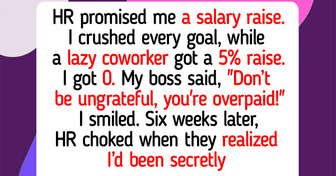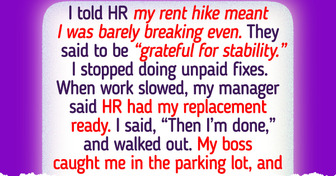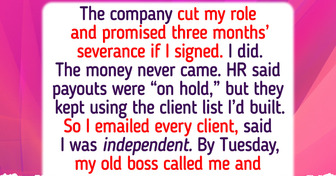You did the right thing. Document everything just in case your manager tried to fire you.
I Refuse to Stay Late at Work—HR’s Response Shocked Everyone

There’s a strange culture in some offices where working your contracted hours is somehow seen as lazy or uncommitted. Managers create unwritten rules about staying late, then act shocked when someone actually leaves on time like their contract says they can. The pressure to work free overtime becomes so normal that doing your actual job during actual work hours feels like rebellion. But sometimes one person refusing to play along exposes just how broken the system really is.
Hi Bright Side,
I got written up for leaving at 5:30—which is literally my contracted end time. My manager called me into her office, looking annoyed, and said, “Everyone stays until at least 7. It shows commitment.”
I looked at her calmly and said, “That’s not in my contract. My hours are 9 to 5:30.” She rolled her eyes and replied, “Well, doing the minimum won’t get you ahead here.”
I left that meeting frustrated but decided to do exactly what my contract said, nothing more. So I left at 5:30 every single day after that.
A month later, HR called me in. I walked in and saw my manager looking smug, like she’d caught me doing something wrong.
But then HR said, “We’ve been reviewing the timesheets. Writing you up for leaving on time goes against company policy and your contract. We need to know what’s happening here.”
Turns out other employees had complained about being pressured to work free overtime, and my write-up was proof. A lawyer had looked at everything.
My manager’s face went red as HR said she’d need retraining and that no one could work past their hours anymore without approval and overtime pay.
Now everything’s different. Some coworkers thanked me quietly, but others are cold, like I messed things up. My manager barely talks to me and is clearly still mad.
I don’t regret standing up for myself, but I’m worried about what happens next. Did I do the right thing? How do I deal with this now?
Please help,
Emma
Thank you for sharing this, Emma. You didn’t do anything wrong—you just followed your contract while others were being pressured to work for free. Standing up for yourself helped everyone, even if some don’t see it yet.
Stick to your boundary without apologizing. Don’t let guilt or awkwardness push you into staying late to “prove” you’re still a good employee. You’ve set a clear boundary, and backing down now would send the message that pressure works if they just make you uncomfortable enough.
Keep leaving at 5:30. Do excellent work during your actual hours, but don’t give free time to a company that tried to write you up for following your contract.
Let your work speak for itself. The best response to people calling you uncommitted is to keep doing great work within your contracted hours. Meet your deadlines, contribute in meetings, and maintain your quality.
This shows that working late isn’t necessary to be good at your job—it’s just extra time that wasn’t being compensated. If your manager tries to claim your performance has dropped, the facts won’t support that story.
Don’t overwork to compensate for the tension. When things feel awkward after setting a boundary, it’s tempting to work extra hard during your regular hours to show you’re still valuable. Be careful with this.
Do your job well, but don’t burn yourself out trying to prove something to people who already showed they don’t respect boundaries. Your worth isn’t measured by how much you sacrifice. You’re already doing what you’re paid to do—that’s enough.
Claire’s date invited her to a steakhouse despite knowing she’s vegan. She ordered a simple side salad, while he had an expensive steak and lobster. But when the huge bill arrived, he insisted they split it evenly. Here’s how she handled it.
Comments
Related Reads
I Refuse to Sacrifice My Health to Keep My MIL Happy, I’m Her DIL, Not a Speechless Doormat

HR Promised Me a Raise Then Gave Me Zero—So I Quietly Got Even

12 Moments That Show Quiet Kindness Is Much Stronger Than the World Thinks

HR Told Me to Be Grateful for Pay That No Longer Covers Rent — Then Reality Hit Harder

I Refuse to Pay for Work Trip Expenses Out of My Own Pocket—HR Got Involved

11 Stories That Prove First Love May Be Short, but Leaves a Lasting Mark Forever

My Family Excluded My Girlfriend From Christmas Because We’re Not Married

17 Moments That Remind Us Kindness Is a Choice, Not a Mood

14 People Who Proved a “Simple Renovation” Can Go Completely Off Script

I Refused to Pay for Our Valentine’s Dinner—Then I Learned the Heartbreaking Truth

15 Stories That Inspire Us to Choose Kindness, Even If the World Gets Ugly

I Lost My Job to “Restructuring” and My Severance Disappeared, Then I Turned the Tables



